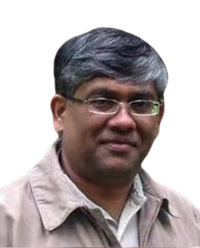பாரதியாரின் கடைசிக் கவிதையின் மூலக்கவிதை கண்டுபிடிப்பு
(இந்தியாவின் அழைப்பு - அமெரிக்கக் கவிதாயினி செய்த கவிதை)
முனைவர் நா. கணேசன்
தலைமைப் பொறியாளர், விண்வெளிக் கட்டமைப்புகள்,
நாசா ஜான்சன் விண்வெளி மையம்,
ஹூஸ்டன், டெக்சாஸ், அமெரிக்கா.
இந்தியாவின் அழைப்பு

வேண்டுகோள்
அன்பிற் கினிய இந்தியா! அகில
மதங்கள், நாடுகள், மாந்தருக் கெல்லாம்
தாயே! எங்கள் உணர்வினைத் தூண்டிய
சேய் நெடுங் காலத்தின் முன்னே சிறந்தொளிர்
குருக்களை யளித்துக் குவலயங் காத்தனை. (5)
திருக்கிளர் தெய்வப் பிறப்பினர் பலரை
உலகினுக் களித்தாய். உனதொளி ஞானம்
இலகிட நீயிங் கெழுந் தருளுகவே!
விடுதலை பெறநாம் வேண்டிநின் மறைவு
படுமணி முகத்தைத் திறந்தெம் பார்வைமுன், (10)
வருக நீ! இங்குள மானுடச் சாதிகள்
பொருகளந் தவிர்ந்தமை வுற்றிடப் புரிக நீ!
மற்றவர் பகைமையை அன்பினால் வாட்டுக!
செற்றவர் படைகளை மனையிடந் திருப்புக!
தாயே, நின்றன் பண்டைத் தநயராம் (15)
மாயக் கண்ணன், புத்தன், வலிய சீர்
இராமனும், ஆங்கொரு மஹமது மினையுற்ற
விராவுபுகழ் வீரரை வேண்டுதும் இந்நாள்!
“தோன்றினேன்” என்று சொல்லி வந்தருளும்
சான்றோன் ஒருமுனி தருகநீ எமக்கே! (20)
மோசே, கிறிஸ்து, நானக் முதலியோர்
மாசற வணங்கி மக்கள் போற்றிடத்
தவித்திடுந் திறத்தினர் தமைப் போலின்றொரு
பவித்திர மகனைப் பயந்தருள் புரிக நீ!
எம்முன் வந்து நீதியின் இயலைச்
செம்மையுற விளக்குமொரு சேவகனை அருளுக நீ. (26)
உத்தரம்
கேள்! விடை கூறினள் மாதா! நம்மிடை
யாவனே யிங்கு தோன்றினன்? இவன் யார்?
உலகப் புரட்டர் தந்திர உரையெலாம்
விலகத் தாய்சொல் விதியினைக் காட்டுவான். (30)
மலிவு செய்யாமை; மனப்பகை யின்மை;
நலிவுறுத்தோரை நாம் எதிர்த்திடாமை;
தீச்செயல் செய்யும் அரசினைச் சேராமை;
ஆச்சரியப்பட உரைத்தனன் -- அவையெலாம்.
வருக காந்தி! ஆசியா வாழ்கவே! (35)
தரும விதிதான் தழைத்திட உழைப்பாய்.
ஆன்மா அதனால் ஜீவனை யாண்டு
மேனெறிப் படுத்தும் விதத்தினை யருளினாய்!
பாரத நாட்டின் பழம்பெருங் கடவுளர்
வீரவாள் கொடியை விரித்துநீ நிறுத்தினாய்! (40)
மானுடர் தம்மை வருத்திடும் தடைகள்
ஆனவை யுருகி அழிந்திடும் வண்ணம்
உளத்தினை நீ கனல் உறுத்துவாய்! எங்கள்
காந்தி மஹாத்மா! நின்பாற் கண்டனம்!
மாந்தருட் காண நாம் விரும்பிய மனிதனை! (45)
நின்வாய்ச் சொல்லில், நீதி சேர் அன்னை
தன்வாய்ச் சொல்லினைக் கேட்கின்றனம் யாம்
தொழுந்தா யழைப்பிற் கிணங்கி வந்தோம்யாம்
எழுந்தோம்; காந்திக் கீந்தோம் எமதுயிர்.
இங்கவன் ஆவிக் கொள்கை வென்றிடவே. (50)
அன்றைக் குணவுதான் அகப்படு மாயின்
நன்றதில் மகிழ்வோம்; விடுதலை நாடி
எய்திடுஞ் செல்வ எழுச்சியிற் களிப்போம்;
மெய்திக ழொற்றுமை மேவுவோம்; உளத்தே
கட்டின்றி வாழ்வோம்; புறத்தளைக் கட்டினை (55)
எட்டுணை மதியா தேறுவோம்; பழம்போர்க்
கொலைத் தொழிற் கருவிகள் கொள்ளா தென்றும்
நிலைத்தன ஆகிய நீதிக் கருவியும்
அறிவும் கொண்டே அரும்போர் புரிவோம்;
வறியபுன் சிறைகளில் வாடினும்; உடலை (60)
மடிய விதிப்பினும்; “மீட்டு நாம் வாழ்வோம்” என்று
இடியுறக் கூறி வெற்றி ஏறி,
ஒடிபடத் தளைகள், ஓங்குதும் யாமே. (63)
- மகாகவி பாரதியார்
*****
More than a century has passed by since the demise of Mahakavi Bharatiyar. The last part of the life of the eminent poet of Tamil was spent in Chennai. He was an ardent reader of the Western press especially the journals supporting the Indian independence movement.
Maude Ralston Sharman was an American poet. She wrote a poem detailing the role of Mahatma Gandhi and his place in World politics. The poem has two parts, the first is asking Bharata Mata, and then the answer from Bharata Mata. Ever since Bharatiyar met Sister Nivedita and others in Calcutta, Bharata Mata was in the Tamil poet’s mind. In fact, Bharatiyar is the one who popularized the concept of Bharata Mata among Tamils and his last poem fittingly deals with the goddess personifying the Nation.
Maude Ralston was born in a family that loved India. Her father was Duncan C. Ralston, a noted Theosophist. The headquarters of the Brooklyn Theosophical Society operated from his home. In 1893, Anagarika Dharmapala was a guest at this house first before he attended the World’s Parliament of Religions in Chicago. After Swami Vivekananda’s USA visit, Maude Ralston became a follower of Vedanta. She married Thaker Dev Sharman, an immigrant from India and they lived in Detroit, Michigan. Here is the poem by Maude Ralston Sharman which Bharatiyar translated. It is published in Unity, a Chicago journal on June 1, 1922. Obviously, this poem was written one or two years before that date and has reached India through her friends in the Ramakrishna Mission. Bharatiyar published the Tamil version in Swadesa Mithran with the title, “Indiavin Azhaippu” on July 19, 1921. The original poem in English by the American poet has not been traceable until now. While reading books about the New Age movement started by Theosophists that introduced Hinduism and Buddhism to Americans, I saw the mention of Maude Ralston. Further research at University libraries led to locating this important praise poem on Gandhi. To the general public, the rendering of Maude Ralston’s poem by Bharatiyar explained the significance of Gandhi’s ideas and political strategy to win freedom from the British.
*****
INDIA'S ROLL CALL
Maude Ralston Sharman
Dear India, thou Mother of nations, creeds and men,
Who gave the world religion in days beyond our ken,
Who sent thy blessed saviours to serve in every clime,
And raised up peerless Walis and Gurus for all time:
Come forth, reveal thy wisdom, unveil that hidden face
We need for our salvation, thy features we would trace,
Come forth unto the nations and settle their disputes,
With love rebuke their hatred, reclaim their war-recuits.
We need such men as Krishna, Mohammed, Buddha, Ram,
We ask, some mighty Rishi may answer: "Here I am"
Some Moses, Jesus, Nanak, men hunger to adore,
Hark! do we hear the answer, who is it in our midst
Confounding worldly councils with the simple words Thou bidst?
Who preaches non-resistance, non-violence, non-hate,
While ceasing to co-operate with a degenerate state?
Hail Gandhi! soul of Asia, who works for Dharma's rule
And calls upon a Higher Self, man's lower self to school,
Who raises high the standard of India's Avatars
That shine in matchless splendour from a galaxy of stars,
Who wakens the discernment, and sets aflame the heart
To melt and fuse those differences that keep mankind apart:
In thee, Mahatma Gandhi, we find the man we seek,
Through thee, the Mother answers, we hear "All-India" speak.
We answer to the Roll Call, arise upon our feet,
And pledge ourselves to Gandhi, his life-work to complete,
Elect to be sufficient to meet our daily needs,
And throne a reign of plenty where Independence leads;
United, free in spirit, we move despite our chains,
And wield for war's blunt weapons, fine moral force and brains:
And though we're bound in dungeons, our bodies doomed to die,
Unshackled and triumphant, "We'll live again," we cry.
*****

இது முத்துக்கமலம் இணைய இதழின் படைப்பு.















